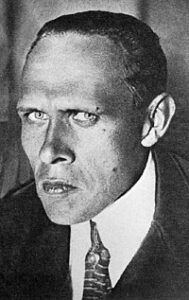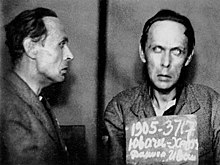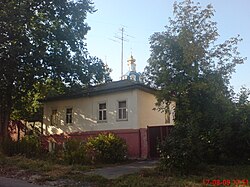In addition to being a gifted poet and member of the creative association “OBERIU,” readers mostly identify Daniil Ivanovich Kharms as a children’s book author. He bestowed to boys and girls poems and tales that, in the passage of time, became timeless. These pieces include “First and Second,” “A Man Came Out of the House,” “The Amazing Cat,” “Liar,” “A Very Scary Story,” “Old Woman,” etc.
Childhood
On December 17–30, 1905, Daniil Ivanovich Yuvachev was born in St. Petersburg, Russia’s cultural center. The youngster was raised in a well-educated and affluent home as he grew older. His father, Ivan Pavlovich, too made a lasting impression on history. After originally framing himself as a revolutionary and a representative of the people’s will and amazingly escaping the death penalty, he transformed into a spiritual writer.
It is known that Daniil Kharms’s father met Anton Pavlovich Chekhov while on a journey to Sakhalin, where he spent eight years working under harsh conditions. Chekhov used Yuvachev as the model for a revolutionary in his work “The Story of an Unknown Man” (1893). After enduring all of fate’s trials and helping Yuvachev get rid of his unceremonious moods, Ivan Pavlovich returned to St. Petersburg in 1899 to work in the editorial office, serve in the inspectorate of the Savings Banks Administration, and pursue his literary interests.
In addition to communicating with Chekhov, Yuvachev Sr. also maintained cordial relationships with Voloshin and Tolstoy. Ivan Pavlovich proposed marriage to Nadezhda Ivanovna Kolyubakina in 1902; the latter belonged to an aristocratic family that had made Saratov province their home. She oversaw the sanctuary and was well-known for consoling ladies who had been held captive. If Nadezhda Ivanovna reared her children with love, then Ivan Pavlovich set rigid guidelines for his children’s behavior. The couple also had a daughter named Elizabeth in addition to Daniel, and two more children passed away at a young age.
The poet studied in the exclusive German school “Die Realschule,” which was a component of the “Petrishule,” the first school established in St. Petersburg in 1702, during the early stages of the revolution that were taking root throughout the Russian Empire. The primary provider for the family had a positive impact on his son: Daniil developed a love for scientific books and started studying German and English, two foreign languages, as a result of his father.
Rumor has it that while Ivan Pavlovich’s kid did well in school, he was also a typical child who liked to pull practical jokes. To get out of trouble with his teachers, Daniil would sometimes pretend to be an orphan and act out scenes. Upon obtaining his degree of matriculation, the young man decided to take a practical route and enrolled in Leningrad Energy College. Kharms, however, did not remain on the faculty of this educational establishment for very long. The irresponsible student frequently skipped courses and did not engage in community service, so he never bothered to obtain a certificate.
Poetry
Daniil Yuvachev started his creative endeavors after being expelled from the Leningrad Technical School. Nonetheless, it is important to note that he cultivated an early passion of creativity: when he was a schoolboy, he wrote a captivating fairy tale, which he read to his sister Natalia, then four years old, whose untimely death shocked the future poet.
Daniil Ivanovich chose to specialize in poetry writing since he did not see himself as a prose writer. However, the budding poet’s early attempts at creation resembled a disorganized stream of ideas, and the young man’s father, who was a fan of rigid and classical literature in the works of Mikhail Lermontov and Leo Tolstoy, did not share his son’s passion for writing.
After 1921, Daniil Yuvachev changed his name to Daniil Kharms. By the way, some writers are still having difficulty solving the riddle surrounding the creative pseudonym chosen by the well-known children’s poet. Rumor has it that Ivan Pavlovich’s son told a friend that the origin of his moniker is the English word “harm,” which means “harm” when translated into Russian. It is assumed, therefore, that the name “Kharms” originates from the French word “charme,” which means “charm, charm.”
Some people think that Daniel’s favorite fictional figure, Sherlock Holmes from Sir Arthur Conan Doyle’s novels, served as the inspiration for his nickname. Additionally, it was once said that the poet fully validated his pseudonym by signing his passport under his true name, “Harms,” using a pencil. Daniil Ivanovich was a gifted writer who adopted numerous aliases that changed like gloves because he felt that having one permanent nickname would bring bad luck. These included Kharms, Haarms, Dandan, Daniil Shardam, and so on.
Daniil Ivanovich starts writing his creative biography in 1924–1926. The young man performs public readings of other people’s poetry in addition to writing his own. Kharms became a member of the All-Russian Union of Poets in 1926 as well, but the writer was kicked out of the organization three years later for failing to pay dues. The poetry of Kazimir Malevich and Velimir Khlebnikov at the time inspired the poet.
A brand-new literary group known as “OBERIU” (the “Union of Real Art”) debuted in Leningrad in 1927. The “chinari,” who championed unique techniques for capturing reality, the grotesque, and the poetics of the ludicrous, rejected traditional forms of art, just as Mayakovsky and other futurists had formerly demanded that Dostoevsky and Pushkin be cast from the modernity ship.
In addition to reading poetry, they hosted dance events where guests performed the foxtrot. This group included Kharms as well as writers Igor Bakhterev, Nikolai Zabolotsky, Alexander Vvedensky, and others. Thanks to Marshak, Oleinikov, and Zhitkov, Daniil Kharms and his colleagues started writing poetry for young readers at the end of 1927.
Works by Daniil Ivanovich were published in the popular magazines “Cricket,” “Hedgehog,” and “Chizh.” In addition, Yuvachev wrote stories, cartoons, and puzzles that both kids and parents could solve in addition to his poetry.
It cannot be argued that Kharms experienced hitherto unseen joy from this kind of work: Daniil Ivanovich disliked kids, but the gifted author relied solely on children’s books for his money. Furthermore, Yuvachev approached his work methodically and made an effort to meticulously complete every task, in contrast to his friend Vvedensky, who, according to some studies, loved to hack and handled his responsibilities with excessive irresponsibility.
Kharms became well-known among young boys and girls, to whom parents, grandparents, and mothers read poetry about a cheery old guy who was terribly terrified of spiders, about a pot-bellied samovar, and about cats who refused to taste the onion and potato vinaigrette.Remarkably, the authorities targeted even the author of children’s books who were deemed innocent because they thought some of Yuvachev’s writings were innocuous. Because of this, the illustrated book “The Naughty Cork” was “under the curtain” for ten years, from 1951 to 1961, after failing to pass censorship. The situation escalated to the point that Kharms and his allies were detained in December 1931 for endorsing anti-Soviet publications; Vvedensky and Daniil Ivanovich were deported to Kursk.
Individual existence
Daniil Ivanovich is seen holding a tobacco pipe in the majority of the images, which is not surprising given that the talented poet rarely let it fall out of his mouth and occasionally smoked on the spot. People who were close to Yuvachev used to remark on his peculiar attire. Kharms purchased clothing from a tailor instead of shopping at fashion retailers.
As a result, the writer was the only one in the city wearing short pants that showed off her leg warmers or socks. However, others were still able to recognize Kharms’ kindness despite his peculiar habits (he would occasionally stand by the window in the home where his mother gave birth, for example). In addition, the poet was a proper and courteous individual who never raised his voice.
In terms of romantic partnerships, Daniil Ivanovich initially selected Esther Rusakova. Kharms wrote an extraordinary amount of poetry about his adoration, but there were reports that Yuvachev turned to the left and Rusakova became enraged, as the poet’s journal entries show. Despite this, their love was not without controversy. The couple officially filed for divorce in 1932.
Marina Malich accepted Kharms’ marriage proposal in the summer of 1934. Up until 1941, when Yuvachev was arrested, the couple lived side by side.
Death
Daniil Ivanovich was detained in August 1941 for allegedly propagating hateful statements. The writer said that the USSR would lose the war, using phrases that scholars claim were lifted verbatim from a denunciation.
Kharms claimed to be mentally sick in order to avoid being executed, and as a result, he was sent to a mental health facility, where he passed away on February 2, 1942. After her brother was rehabilitated by the Prosecutor General’s Office, his sister was able to clear his record after eighteen years.
